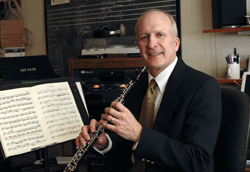Inside Iowa State
Inside ArchivesSubmit newsSend news for Inside to inside@iastate.edu, or call (515) 294-7065. See publication dates, deadlines. About InsideInside Iowa State, a newspaper for faculty and staff, is published by the Office of University Relations. |
Oct. 6, 2006 50 years of the oboeby Dave Gieseke, LAS Public Relations It's not the easiest instrument to learn. Kevin Schilling admits there are times when it is difficult to play. "For years I think I have had a love-hate relationship with the oboe," the associate professor of music said. "Although you would have a hard time trying to find an oboe player that wasn't just a little frustrated. 
Kevin Schilling will celebrate his 50th year of playing the oboe with a recital Oct. 15. He began playing the oboe in fourth grade, and later picked up the bassoon. Photo by Bob Elbert. "If you're not frustrated as an oboe player, then you're either a genius or so bad you don't know any better." The oboe is the woodwind instrument that looks like a clarinet, but instead has a funny looking reed protruding out the top of it. It's an instrument Schilling said is totally useless without a reed -- and a good reed at that. It's also an instrument that is difficult to play. "The breathing is so unnatural because the oboe uses the air slower than your body does," Schilling said. "You must breathe out before breathing in at breathing points in the music. "And the aperture that you have to use, your lips get so tired that you can't play very long." Because of this, oboe players tend to tire more quickly than other musicians. In college, Schilling thought about switching instruments, but he stayed with the oboe. He eventually picked up a bassoon and became an accomplished player on that as well. "In spite of the frustrations, I wasn't going to quit," Schilling said. "I was going to conquer it first. Then I could quit. "But I knew that then I wouldn't want to." It's all about the reedThe funny looking reed at the end of his instrument is essential to how well Schilling (or any oboe player for that matter) plays. "The reed is an albatross," Schilling said. "My reeds don't last very long before I have to get another one." Schilling has used his reeds for as short a time as one rehearsal. Rarely do they last longer than a week or two. He said oboe players spend decades in a never-ending quest to make the perfect reed. The way a reed plays changes with the weather or the type of music a musician selects to perform. So most professional oboe players make their own reeds. Schilling said he has made countless reeds for himself and others over the years. And while you can save money by making your own reed, that's not the reason he does it. "The oboe is totally useless until you put a reed with it," he said. "The real secret to playing the oboe is having a good supply of reeds on hand. If you do that, then typically something you have on hand will work. "To me, that represents hope that there is always a possibility that you have an instrument in your hands that is perfect." Celebrating 50 yearsSchilling should know. This month he enters his 50th year of playing the oboe. He's celebrating with a special oboe/bassoon recital at 7:30 p.m. Sunday, Oct. 15, in the Martha-Ellen Tye Recital Hall. Schilling first picked up the oboe in the fourth grade and played in an elementary school band in Stockton, Calif. His parents were both keyboardists, yet they hadn't forced Schilling and his siblings to take piano lessons. "My father did a good job of subtly telling us which instruments we should play," he said. That was the case even when the young Schilling made a tactical error in describing what type of instrument he was going to learn. "I told my father, 'I want to play the black instrument you play like this,' and wiggled my fingers in front of me to mimic a clarinet player," Schilling said. "My father said, 'You mean the oboe. Everybody plays the clarinet.'" That's how Schilling became probably the first oboe player his elementary school ever had. As he prepares to celebrate 50 years as an oboist, Schilling will present a variety of selections at the recital, including compositions by Bach, Marcel Bitsch, Francois Devienne and Alvin Etler. He will be joined by music colleagues Lynn Zeigler, organ; William David, piano; Sonja Giles, flute; and Joseph Messenger, clarinet. One musical piece Schilling will perform at the recital will have special meaning to him. The first piece of music he remembers playing was Mozart's "Andante from Piano Sonata K 545." Yet, while he practiced the music, he never played it in public. That changes Oct. 15. |
Quote"If you're not frustrated as an oboe player, then you're either a genius or so bad you don't know any better." Kevin Schilling |